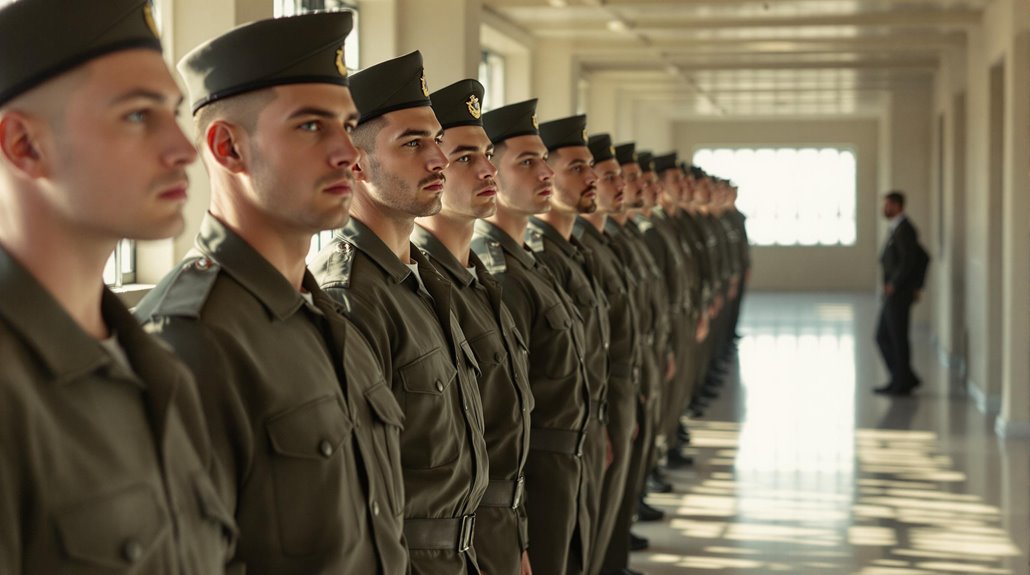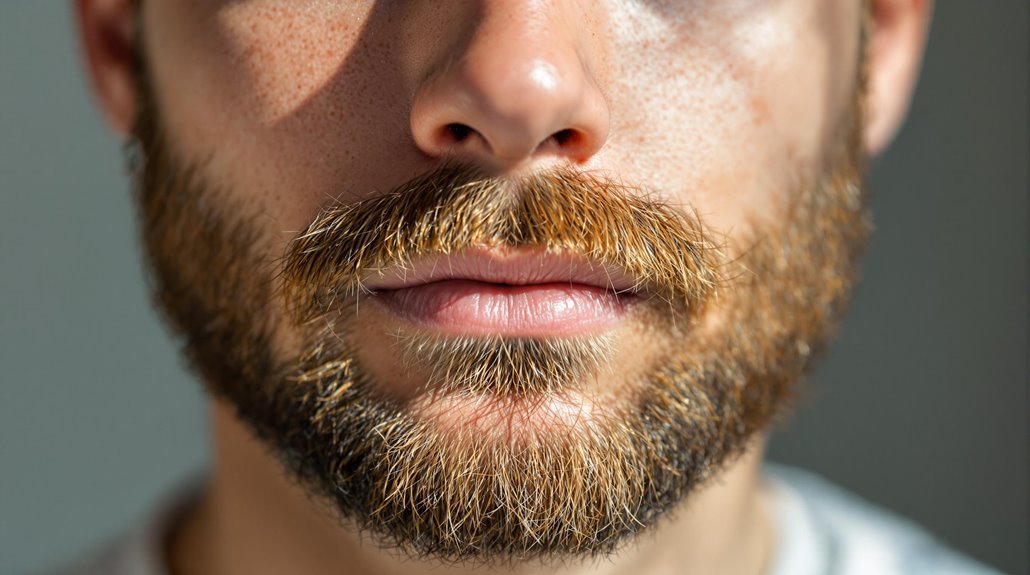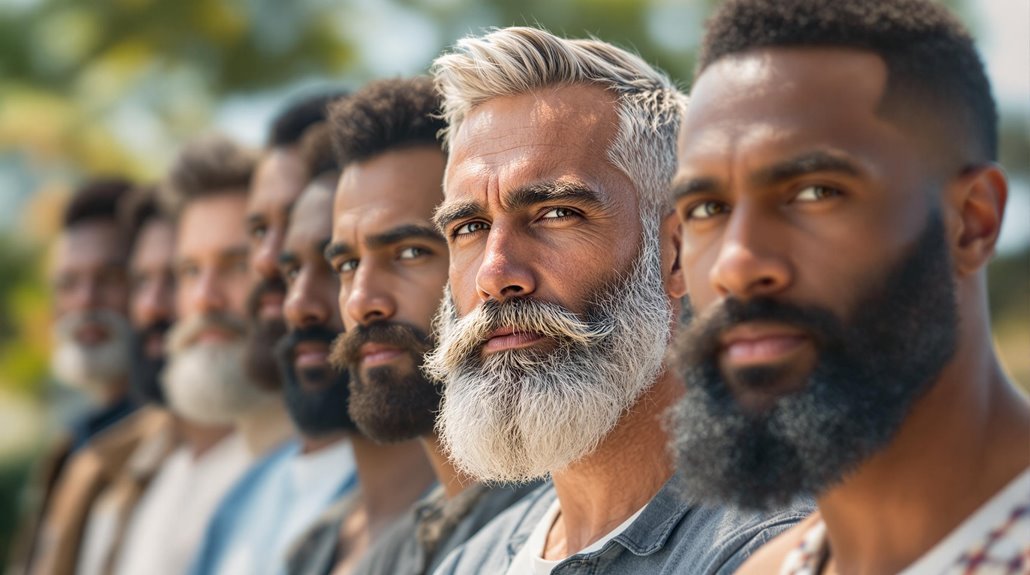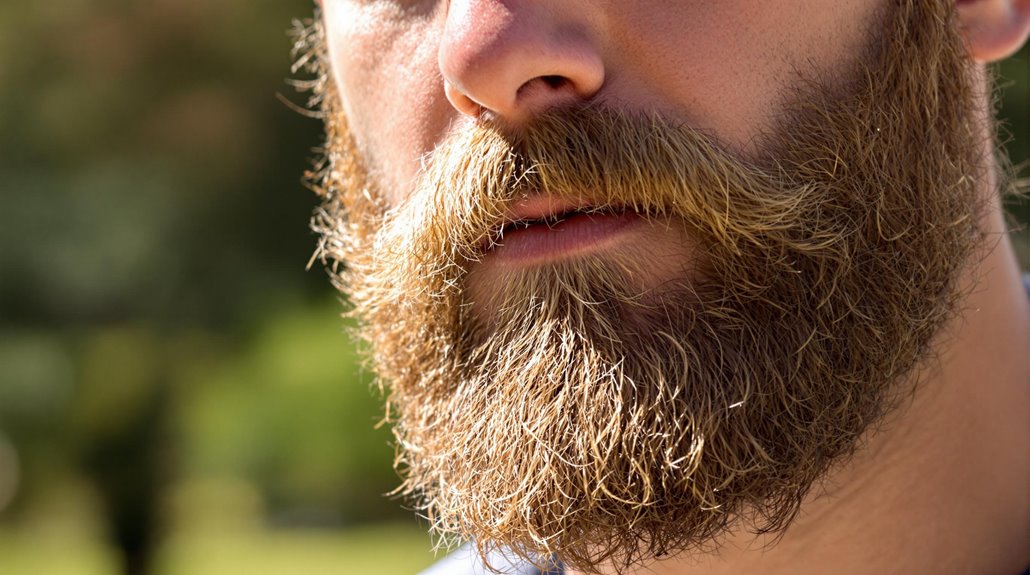Why Do Navy Seals Grow Beards?
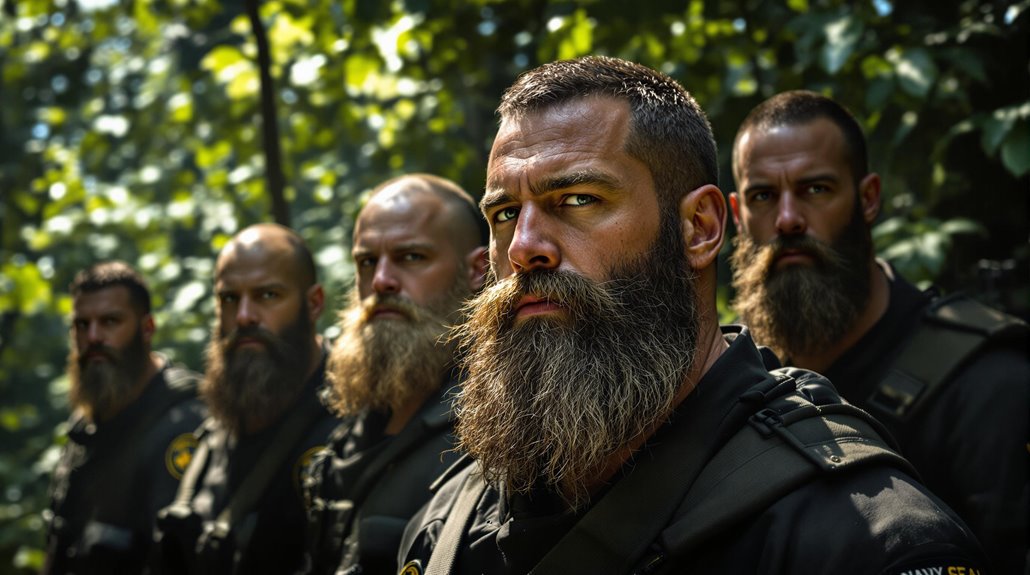
Navy SEALs grow beards for practical and strategic reasons. They provide natural camouflage and protection from harsh conditions, making missions more effective. Beards also help SEALs blend into cultures where facial hair holds significance, fostering trust and rapport crucial for success. Historically, beards symbolize defiance and solidarity, enhancing team morale and individual confidence. Current military policies debate clean-shaven standards against the need for cultural adaptability and inclusivity. While some see beards as unprofessional, their advantages in certain environments can't be overlooked. There's more to investigate about how beards benefit SEALs in and out of operations.
Historical Significance
Frequently, the historical significance of Navy SEALs growing beards traces back to the bold traditions of British Commandos in WWII. These Commandos were pioneers, embracing facial hair as they set out on daring raids and sabotage missions. Beards became more than just a practical choice; they symbolized a break from conventional military grooming standards. For Special Forces like the Navy SEALs, facial hair represents defiance, individuality, and a badge of honor.
As military personnel, you might appreciate how this tradition reflects a culture of resistance within elite units. Beards aren't just about resisting grooming standards; they're about embracing a deeper, shared identity. Historically, facial hair in the military has been linked to masculinity, courage, and endurance—qualities that define Special Forces operators. For Navy SEALs, growing a beard becomes a reflection of these timeless values, reinforcing team cohesion and unity.
Additionally, the presence of beards in elite military units highlights the importance of cultural sensitivity. In regions where facial hair is highly regarded, adapting to these norms can improve operational effectiveness and demonstrate respect for local customs. Embracing beards, consequently, becomes a strategic choice steeped in both history and cultural awareness.
Practical Advantages
Some might wonder why Navy SEALs choose to grow beards, but the practical advantages are clear. A beard offers more than just a rugged appearance; it contributes considerably to operational effectiveness. In rural or wooded environments, natural camouflage becomes vital. A beard helps SEALs blend seamlessly into these surroundings, making it harder for adversaries to spot them during covert operations.
Additionally, facial hair provides important protection against harsh environmental conditions. Regardless of the scorching sun or biting cold temperatures, a beard acts as a barrier, shielding the skin during extended missions. This practical benefit guarantees that SEALs can maintain focus on their tasks rather than deal with discomfort or skin damage.
Cultural adaptation is another significant advantage. In regions where beards symbolize maturity and respect, having facial hair allows SEALs to integrate more easily with local populations. This adaptation reduces the likelihood of them being identified as foreign operatives, enhancing their operational effectiveness.
Consider these practical benefits of beards for Navy SEALs:
- Natural camouflage: Helps blend into rural or wooded environments.
- Environmental protection: Shields against sun and cold.
- Cultural adaptation: Facilitates blending with local populations.
Psychological Impact
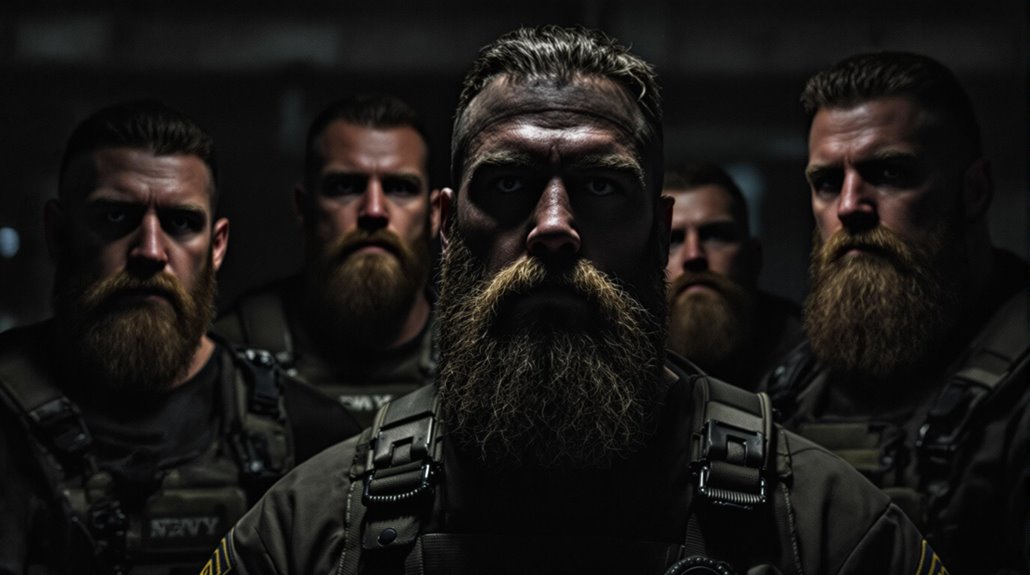
The psychological impact of growing beards for Navy SEALs is profound. When you accept your beard, it improves your confidence and self-reliance, allowing you to express your personal identity within the rigid military environment. This small act of personal grooming can greatly contribute to your mental well-being, offering a sense of autonomy amidst the structured demands of military life.
Beards aren't just about individual expression; they foster team cohesion and morale. As a SEAL, wearing a beard becomes a shared symbol of identity and unity, strengthening the bonds within your team. This collective identity is essential for maintaining high morale and ensuring effective collaboration during demanding operations.
Moreover, beards serve as a psychological tool. In the face of conventional military grooming standards, maintaining a beard symbolizes defiance and reinforces your identity as an elite operator. It sets you apart, underscoring your unique role and capabilities within the military.
In certain regions, where facial hair holds cultural significance, your beard can demonstrate cultural sensitivity, positively impacting your interactions with local populations. This awareness can improve your operational effectiveness, further supporting the psychological benefits of wearing a beard as a Navy SEAL.
Cultural Adaptation
Building on the psychological benefits of beards, cultural adaptation plays a significant role in the operational success of Navy SEALs. When deployed in regions like the Middle East, growing a beard isn't just about looking rugged. It's a strategic move to blend in with local populations, where facial hair is often a respected cultural norm. By aligning with local customs, SEALs can demonstrate cultural sensitivity, fundamental for building trust and rapport with communities they engage with.
Facial hair isn't always about aesthetics; sometimes, it's about survival. Beards can act as camouflage in rural or wooded environments, enhancing operational effectiveness by making SEALs less conspicuous during missions. This adaptation is significant for traversing complex cultural landscapes, where understanding and respecting local traditions can mean the difference between success and failure.
It's not uncommon for beards to hold religious significance, and by growing them, SEALs respect these deeply embedded values. This respect can open channels of communication, fostering alliances that are imperative during deployments.
- Blend in with local populations: Facial hair helps SEALs integrate seamlessly.
- Respect local customs: Demonstrates cultural sensitivity.
- Enhance operational effectiveness: Acts as camouflage in mission-critical environments.
Team Dynamics
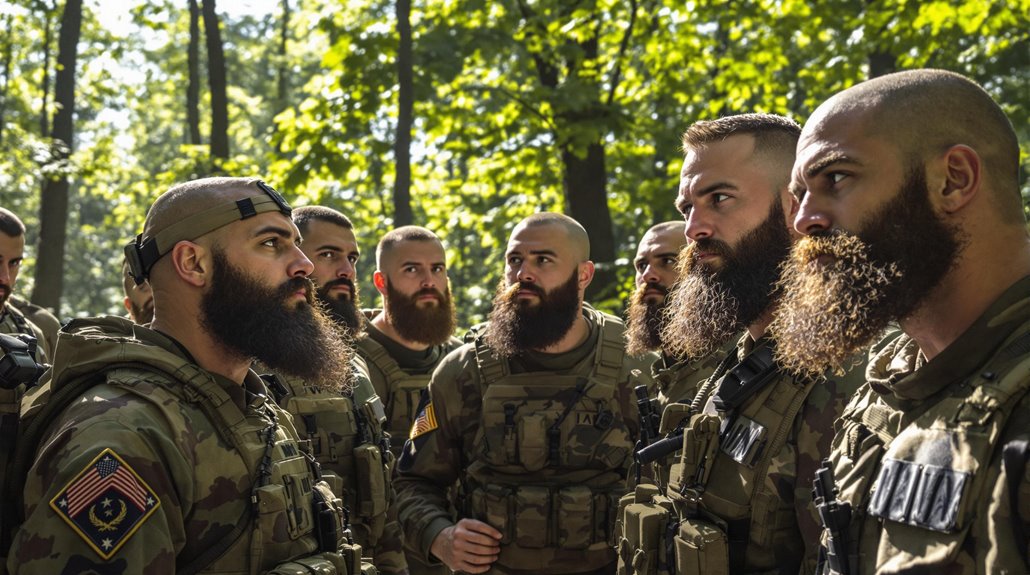
When Navy SEALs grow beards, they don't just adopt a new look; they cultivate a shared identity that boosts team cohesion and morale. Beards become a symbol of solidarity among personnel, creating a sense of unity that reinforces team dynamics. This shared experience fosters an environment where confidence and self-reliance thrive, vital traits in high-stakes missions.
You might think individuality and teamwork are contradictory, but in the SEAL community, they go hand-in-hand. The choice to grow a beard signifies a rebellion against conventional grooming standards, reinforcing a culture where personal expression is valued. This acceptance of individuality improves interpersonal relationships within the team, as each member feels respected and understood.
Moreover, beards serve a practical purpose in operations requiring cultural sensitivity. They allow SEALs to blend seamlessly with local populations, promoting trust and collaboration. This ability to adapt and connect with others is fundamental for successful missions, further improving the team's effectiveness.
Incorporating beards into their identity reflects a broader understanding within the SEAL teams. By embracing individuality, they create a dynamic where each member contributes distinctly, strengthening collective team dynamics and solidifying their bond.
Grooming Policies
Debate over grooming policies highlights the tension between tradition and modernization within the Navy. Traditionally, the Navy's grooming policies strictly prohibit facial hair, making exceptions only for medical conditions or religious reasons. This restriction has sparked ongoing discussions about inclusivity and personal expression within the ranks. While the Marine Corps allows beards in non-combat roles, the Navy's accommodations are mainly for shore duty, creating a complex landscape of rules that can be challenging to navigate.
The Navy's prohibition on beards, which has been in place since 1985, faces criticism for being outdated, especially as it may disproportionately impact service members of African descent. Calls for policy reevaluation are growing louder, emphasizing the need to address these concerns and adapt grooming standards to reflect the diversity of today's Navy personnel.
A study conducted in November 2021 examined the impact beards have on gas mask seals, with findings sent to the Secretary of the Navy by June 2023, but they remain undisclosed. This study could potentially influence future policy changes.
- Traditional restrictions: Beards only for medical conditions or religious reasons.
- Marine Corps: Beards allowed in non-combat roles.
- Study findings: Impact on gas mask seals still undisclosed.
Challenges and Criticisms
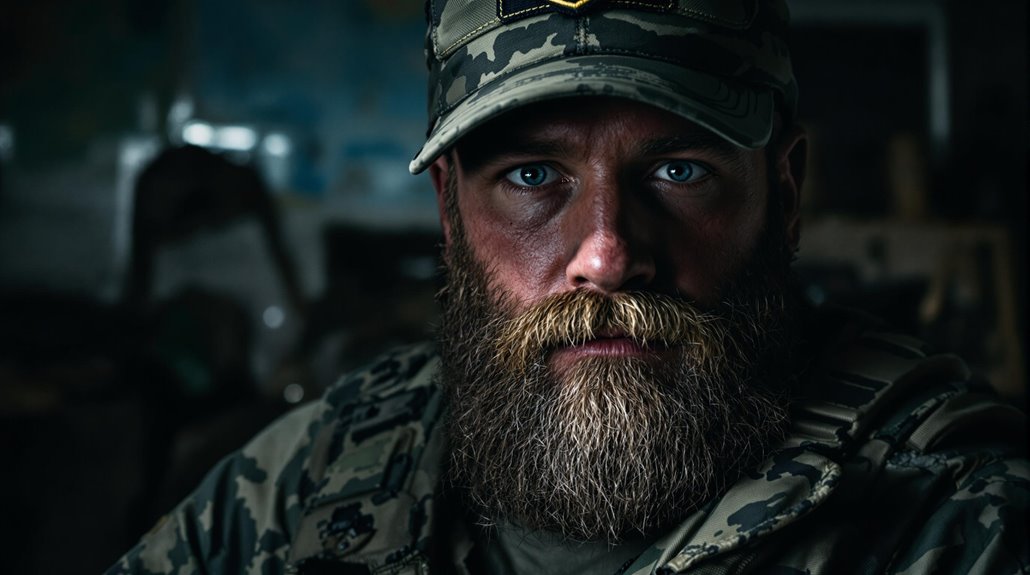
The debate over grooming policies sets the stage for examining the challenges and criticisms surrounding Navy SEALs and their beards. One major concern is the potential for stereotyping and perceptions of unprofessionalism within the Armed Forces. Beards can sometimes lead to discriminatory attitudes, affecting how SEALs are viewed by their peers. Moreover, inconsistent grooming standards across military branches create confusion. What's acceptable for one group might not be for another, leaving SEALs uncertain about what's appropriate.
Proper hygiene and beard care are essential because beards can harbor bacteria and dirt, raising health concerns if neglected. It's important to keep them clean to avoid these issues, but the need for constant maintenance can be challenging. Operational effectiveness is another concern, especially regarding gas masks. Some worry that beards might prevent a proper seal, although studies suggest short beards pose minimal risk.
Furthermore, current regulations can disproportionately impact certain demographics. For instance, Black SEALs might need no-shave exemptions due to skin conditions like Pseudofolliculitis Barbae. This inconsistency highlights the need for fair and equitable policies that consider individual needs across the Armed Forces.
Future Considerations
As the Navy charts a course for future grooming policies, it's vital to address the growing demand for inclusivity and cultural sensitivity. You might see changes that allow facial hair, as the Navy reviews its beard policies. This is particularly important for Black sailors who have been affected by conditions like Pseudofolliculitis Barbae. The old clean-shaven mandate has been criticized for disproportionately impacting these service members. By considering more equitable grooming standards, the Navy can promote fairness and respect for individual health needs.
Future policies could align the Navy with global practices where beards are permitted without compromising professionalism. Nearly all other naval forces worldwide already allow facial hair, challenging the outdated notion that a clean-shaven look is necessary. There's also a potential economic upside to these changes, such as reducing medical costs associated with treating PFB.
Balancing operational safety with personal expression and morale will be significant in these discussions. Allowing beards might improve service members' sense of identity and belonging. Here's what the Navy might focus on as it evaluates these changes:
- Inclusivity and cultural sensitivity
- Health and economic benefits
- Aligning with international standards

